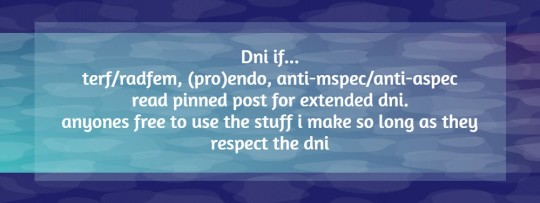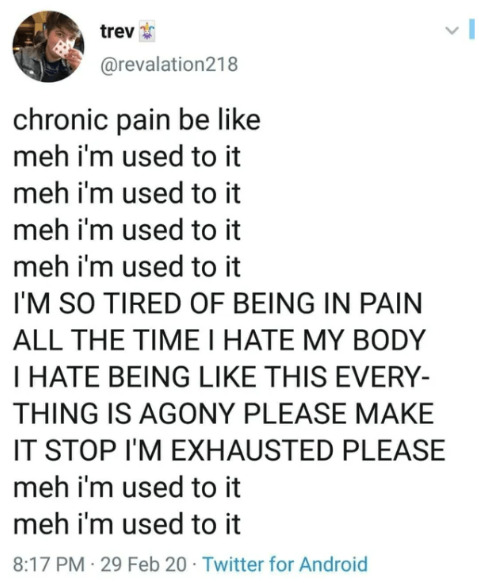#Jaw pain
Explore tagged Tumblr posts
Text
My braces hurt..

7 notes
·
View notes
Text
chronic internal pain sucks worst than chronic physical pain (for me, everyone experiences things differently)
like when my jaw hurts more than usual i can do something to massage it to help lessen the pain doesn't make it go awat but its less
when my ibs says fuck you for whatever reason, all i can do is pray even though I know any god has gone deaf to my words
10 notes
·
View notes
Text
Jaw, Back and Joint pain/issue flags



left: a flag for people with jaw pain and/or other jaw issues, encompassing all kinds of issues one might have be it chronic, dental, deformities etc.
middle: a flag for people with back pain and/or other back issues, encompassing all kinds of issues one might have with their back in general be it muscle, spinal, nerve, chronic, deformity, defect etc.
right: a flag for those with joint pain and/or other joint issues, encompassing all kinds of issues one might have with their joints be it wrist, fingers, ankles, elbows, chronic, arthritis etc.

these flags are exclusive to people with these issues.
transx/transid ppl do not fucking touch my posts thanks.

#chronic pain flag#chronic pain#chronic illness#chronic disability#jaw pain#jaw issues#back pain#back issues#joint pain#joint issues#admin kazuha/link#my flags#pride flags#flag blog#flag coining#flag designs#pride flag#flag reblog#flags for disabilities#flag design#flags for the physically disabled#physical disability#physically disabled flags#flags for physical disabilities#disability flags#disability#disabled#disabilties
46 notes
·
View notes
Text
They should invent a jaw that doesn’t slip and click clack whenever I try to chew food. It huuurts.
#chronic pain#jaw pain#TMJ#tmd#vent post#I just wanna eat in peace#why does my jaw have sound effects
13 notes
·
View notes
Text
Solarpunk … orthodontics?
My jaw hurts.
It’s hurt for decades; I started clenching it at night when I was asleep when I was a preteen. This coincided with several factors, none of which I think are wholly the source but were probably contributors to the issue: we had just moved cities and I was under a ton of stress moving to a new neighbourhood and starting at a new school for the first time, I had just begun an orthodontics saga of many years which started with wearing headgear to forcibly shove my upper back molars further back into my skull in order to make room for the rest of my upper teeth to move backwards (with the eventual help of braces) to correct an overbite that was starting to affect my bite, and that I was an extremely anxious eldest child. Looking back, it’s clear I was on the spectrum and had a diagnosable anxiety disorder. But discovering that would be much further in the future.
All I knew at the time was that my jaw hurt. I told my dentist and orthodontist and they recommended I sleep on my back, so that I would have less chance of clenching. I did this, and still to this day must choose: do I sleep clenching my jaw, or with my mouth wide open? I have a choice between a) painful muscles or b) terrible breath in the morning + slowly yellowing teeth. Hoorah. I wasn’t given any other advice.
It is at this point that I would have liked any of the professionals involved in the process to have talked to me about the ramifications of seriously and irrevocably altering the shape of my jaw on the surrounding musculature but frankly, I’m not sure they were trained to do that. And by “that” I mean talking to children, communicating professional knowledge to a lay audience, and knowing about the muscles of the face all at the same time.
I would hope that in a future solarpunk society, there would be people with those skillsets employed by health professionals to communicate and emphasize a more holistic look at healthcare - in a way that meets people where they’re at. I was thirteen; I wasn’t ready to hear or understand even the little that dentists would tell me now in my late thirties. I needed someone skilled to discuss this with me. The braces and headgear needed to happen: my bite was getting painful, my overbite was growing so extreme. But even a knowledge of the side effects would have been empowering to me, as a child. I had very little say in any of this process, though I got to pick the colour of the elastics around my braces, yay.
My jaw still hurt.
In the early days of 2012, I woke up one morning and couldn’t chew my food without pain: not even soft foods such as pancakes were safe. I made an emergency appointment with my dentist at the time, who quickly assessed the issue and whipped up a mouthguard for me. I didn’t have insurance at the time (having aged out of my parents’ coverage, and none afforded by my college), and the dentist was sensitive to that, and gave me a discount. Bless him; I’m sure he’s long retired, but I hope that if that little family dentist office off the Danforth in Toronto is still in operation, that it’s seeing some good years.
Wearing a mouthguard every single night to bed wasn’t foreign to me, because I’d worn the retainer I was given after my braces came off religiously for many years until about two years before this. I still wear a retainer to this day: it not only makes it so that I am not clenching quite as hard, but it saves my teeth from the bone-cracking pressure. (I was informed by my current dentist that clenching my teeth is a major contributor to my receding gums, which is a current dental issue I have, yay again.)
My jaw still hurts now, though.
In that future solarpunk world, I’m sure young people wouldn’t wake up with debilitating pain in their jaw and be forced to think above all else about how this is a financial setback. In a future solarpunk world, I would hope that insurance coverage would be a thing of the past, as it would be unnecessary. I don’t know how the details of that would work out. I just know it would save so many young people from worsening the anxiety that was already so bad that it led to jaw pain.
When I moved to a new city and saw a new chiropractor, he would help me to mobilize and relieve the tension somewhat in those muscles at the end of each appointment. It helped, somewhat, especially to mitigate the damage caused by the stress of graduate school - and then a car accident, and then COVID.
I was finally diagnosed with an anxiety disorder several years ago, and though I’m mitigating it to my best abilities, I haven’t stopped clenching my jaw while I sleep, or during the day subconsciously. I’m still searching for some sort of relief other than constantly wearing my nightguard, which is just an automatic thing that I do after brushing my teeth every night. (I don’t think that this sort of wearable tech makes me a cyborg, just a boring responsible person.)
In a solarpunk world, many people are going to need dental surgery. Many people are going to need orthodontic interventions. It’s just a fact. But what can we do now to make sure that the dentists and orthodontists of the future actually work to make their patients’ lives better, not just their teeth?
This is my two cents’ worth. What do you think?
PS: I should mention that though I live in Canada, dental is not covered by our (ailing, politically besieged) social healthcare system.
#healthcare#dentistry#solarpunk healthcare#jaw pain#orthodontics#dentist#dental#bones#anxiety#muscles#teeth#headgear#braces
14 notes
·
View notes
Text
I don’t even count how many ibuprofen pills I take anymore
#disabled#headache#chronic headaches#chronic pain#chronically ill#real life#actually disabled#disability#ibuprofen#i do not recommend#jaw pain
11 notes
·
View notes
Text
Why is sore jaw back
Can't my joints relax??
5 notes
·
View notes
Text
#tmd#tmj#migraine#jaw pain#MHAM#health information#tmj disorder#tmj dysfunction#comorbidities#migraine causes#comorbid conditions
3 notes
·
View notes
Text

Jaw Pain Giving You a Headaches
TMJ presents in several ways and causes a wide range of discomfort levels and jaw mobility issues. Most people don’t see a specialist until their TMJ symptoms become unbearable or overwhelming. Don't wait, seek help in recognizing the source of your TMJ and begin treatment to avoid further damage to the jaw joints or bone structure.
For more details — https://cheneywadentist.com/cheney-wa/tmj/
2 notes
·
View notes
Text
Send help the pains getting worse and I haven’t even today but when I try it feels like I’m ripping my jaw in half 😭
#cavity#teeth filling#dental pain#nerve issues#Tmj#jaw pain#mouth pain#teeth pain#dentist#fang rambles#I am in pain#chronic pain
9 notes
·
View notes
Text
y'all i am fucking suffering rn. my jaw keeps locking and being really painful when it unlocks- is this how i attract peoples attention at uni. by being the beautiful but mysterious girl who doesnt speak. because she cant
#normally i hate the dentists but im kinda looking forward to my next appointment now so i can go in and say#'oi mate my face isnt working'#beep beep gets personal#personal#textpost#text post#jaw#jaw pain#uni#university
3 notes
·
View notes
Text
All I can think about when someone says 'i have tmj' is, that's the same as saying 'i have leg'
Tmj is just a joint, we all have tmjs! What you have is tmjd, which is a disorder of that joint
#can i be pedantic for a moment thx it always bugs me when i see this#tmj#tmjd#jaw pain#chronic illness
2 notes
·
View notes
Text
Gastroparesis / Jaw Pain?
Hi Tumblr friends! Does anyone have experience with gastroparesis and/or jaw pain? A few days ago, I took 10mg Loratadine (anti-histamine) on two consecutive days and developed what I think is gastroparesis. Slow stomach emptying, feeling full much more readily than usual, throat pain (especially when swallowing). I also had some jaw pain on my lower jaw (mostly on the left side). I woke up this morning with a very sore jaw. This is a new symptom for me. I have severe ME/CFS and POTS. Do you have any thoughts/tips? <3
#gastroparesis#me/cfs#myalgic encephalomyelitis#chronic fatigue syndrome#pots#Postural Orthostatic Tachycardia Syndrome#Postural Tachycardia Syndrome#long covid#jaw pain
8 notes
·
View notes
Text
BATHROOM & BLACKOUTS
Blog | delphinemusic | Enduring daily #Blackouts, with the Nauseating #ChronicPain is crippling... #Fibromyalgia #chronicillness
All I wanted to do was play SIMS. Or Mass Effect Andromeda. Instead… I ended up Blacked Out for nearly an HOUR & A HALF in the Bathroom, when I was forced [by my body] to Go…. And Then – when I finally managed to literally drag myself back to The Room at 12:30am…I Passed Out/Blacked Out Once Again for Another Hour…. Coming round at 01:53am, this time. This is what I get from just needing to go…
View On WordPress
#Autistc#Blacking Out#blackouts#chronic illness#chronic pain#claustraphobia#disability#distress#fibro#fibro flare up#fibro flareup#fibromyalgia#Fibroplegia#jaw pain#jaw spasms#Pain#paraesthesia#paralysis#spasms#stress#Vestibular Migraine
2 notes
·
View notes
Text
Dont grind your teeth if you can help it, like seriously i started grinding my teeth as a stim for when im stressed but HOOOO THAT WAS DUMB I now have temporomandibular joint dysfunction (I also grund my teeth at night aparently) and have almost constant jaw pain and annoying stuff like that. So yk. If you've started grinding your teeth, do your very best to stop it.
2 notes
·
View notes
